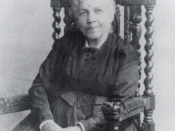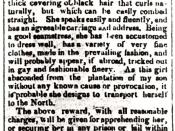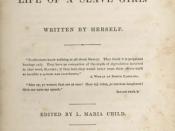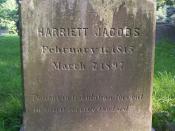How lucky were we to be born under the circumstances which we were? How blessed are we to live in the current conditions in which we live? All too often these are questions that are not pondered, but are aspects of life that are taken for granted. Harriet Jacobs and Hatsuyo Nakamura lived lives under conditions we cannot begin to imagine or even comprehend the realities they faced with each new day. Harriet and Hatsuyo were two strong willed women that were victims of circumstance, they had all the cards stacked against them, yet through perseverance they raised great children and chose to be positive elements in a society which oppressed them.
Harriet Jacobs lived a life as a slave in constant fear and uncertainty. From the time that Harriet was born she was owned. She was a possession of someone else and therefore raised with the mentality she was not in possession of her own destiny.
Fear is something that Harriet became accustomed to. With each choice that Harriet made came the consequence that it was not the right one in the eyes of her owner. She had to take into account her children and their well being with each decision she made. She feared for them more than she feared for her own salvation. Harriet went to sleep each night with a fear of what the next day would bring and awoke each morning to live through another day in her nightmarish existence. With uncertainty and the unknown comes fear, whether it is the fear of an unjust and cruel slave owner or the attack of a foreign military.
The air raid sirens rang each day. The people of Hiroshima knew their time would come, they just didn't know when. Hatsuyo Nakamura, a widow, with three children often awoke to the sound of the sirens, fearing that this time might their time. The constant sound of the radio reports in the background, the planes humming overhead, the conversations of people in the streets, all added to and excited this intense fear imbedded within the residents of Hiroshima. Hatsuyo's fear was a little more extreme. Her instincts and human nature as a mother of three led her to worry less for herself, but instead, concentrating all her fear towards the well being and procurement of the lives of her children. Like Harriet, she wanted the best for her children, but their financial situations and uncontrollable events made their struggle much more difficult.
Harriet desired a better life than she had lived for her children. Parents in general, but more so the mother, worry about the development and upbringing of their children. Harriet's dilemma was the fact that her children were hers biologically, but they were not her property. They became the natural property of her owner. In the cruel world of slavery, children were to unfortunately, "inherit the fate of their mother"� (Brent x). Harriet was thus destined to have no impact on the lives of her children. They would be raised by her owner and then eventually be sold off. Harriet was determined to not let her children become victims of an unjust society,she stated that, ""æI must fight my battle alone. I had a woman's pride, and a mothers love for my children; and out of the darkness of this hour a brighter dawn should arise for them"� (Brent 94,95). The bond between mother and child is strong. It is a bond that even the perils of slavery and the trials of war struggle to break.
"The debris did not cover her deeply. She rose up and freed herself. She heard a child cry, "ÃÂMother, help me!'"� relates Hersey in telling Nakamura's story (Hersey 9). Her children were in pain and this was something Hatsuyo hated to witness. Little did she know the pain and suffering caused by the initial drop of the bomb would be insignificant compared to the aftermath. No one could have prepared her for her post war lifestyle and living conditions. Her family was left without a home, forced to live in a hut, on a fifty- cent a day income. How would she provide for the children she so dearly loved? The war left scars on Hatsuyo, however, none were visible. She suffered from scars of fatigue, constant sickness, poverty, and prejudice. She was determined to overcome each of these, her children were too important to her to think any differently.
Oppression ruled Harriet Jacobs life. She couldn't take it any longer and decided to make her escape. She was in constant worry of being caught and having her cover blown. She had escaped her owner, but she was still a black person living in a white person dominated world. Even though she had escaped she was still the property of someone else, she did not belong to herself. Being owned by someone else is a concept that seems so foreign in today's world but was a harsh reality for Harriet even after her escape. Her original owner had died but she was still the property of his daughter and this daughter felt she was entitled to what was rightfully hers. Harriet never came to grasps with this concept. She lived in a liberty driven, Christian dominated society, but was still considered to be a sub-human piece of property, oppressed because of the color of her skin.
"ÃÂHibakusha', explosion-affected person, was the label that Mrs. Nakamura and her family were forced to wear the rest of their lives. She didn't realize that the nightmare hadn't ended with the explosion and the short time thereafter. She could never escape the unwanted prejudices that haunted her following that fateful day in August, 1945. "Non-hibakusha employers developed a prejudice against the survivors as word got around that they were prone to all sorts of ailments,"� stated Mrs. Nakamura concerning her quest for employment (Hersey 92,93). Surviving the bomb had now become the easy part, surviving the cruel realities of the world became the challenge. "Those words struck me like a blow. So I was sold at last! A human being sold in the free city of New York!"� rejoiced Harriet after receiving word of her newly attained freedom (Brent 225). Harriet was no longer a possession; she was her own person who realized her own destiny. She was no longer confined and undermined by a corrupt owner. Freedom had also wrapped its wings around her children as they began to realize their dreams in pursuing trades and education. The seven years of hell she spent in the box were now starting to become worthwhile. She had endured and conquered one of the toughest paths that life has to offer.
Years after the bomb Nakamura san's life began to blossom much as the flowers had in the flower festival that she was now dancing in. "The bombing had been four decades ago. How far away it seemed! They danced to Oiwai ""Ondo, a song of happiness, lifting their arms in gestures of joy"æ"� (Hersey 100). Hatsuyo had made great strides in her life. Her children had gone on and married and lead successful lives of their own. Japan, a country that at first gave no support to the victims of the A-bomb was now realizing its responsibility and compensating victims like Hatsuyo and her family. The Nakamura family had come a long way since the bombing. They never chose to associate themselves with antinuclear groups or pro-hibakusha movements. They chose to be silent but optimistic examples of life after war and did not see themselves as unfortunate victims, but rather as hopeful survivors.
Harriet Jacobs and Hatsuyo Nakamura lived in very different time periods under very different conditions. Harriet lived the life of a slave, Hatsuyo lived the life of a bomb victim. Though their circumstances seem entirely different, they are mysteriously linked in the paths that their lives followed and the dilemmas each faced. They were focused on living a normal life. The life of fear was not one they enjoyed. They wanted their children to have what they never did, to grow up with the normal comforts of life. They wanted to be treated as a everyone else was, not as abnormal "ÃÂthings' in society. Harriet Jacobs and Hatsuyo Nakamura overcame the dilemmas which plagued them. They beat the odds in a society which told them they wouldn't. They are living examples of perseverance and hope for us all.





